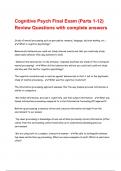-
1. Exam (elaborations) - Ap psych unit 3, lesson 3 vision - sensory and perceptual processing, module 22 pgs. ...
-
2. Exam (elaborations) - Ap psych unit 3, lesson 4 visual organization and interpretation, module 23 pgs. 233-...
-
3. Exam (elaborations) - Ap psych unit 3, lesson 5 hearing, module 24 pgs. 244-49. comprehensive questions and...
-
4. Exam (elaborations) - Ap psych, unit 3 lesson 6 the other senses, module 25 pgs. 251-62 comprehensive quest...
-
5. Exam (elaborations) - Ap psych unit 2 lesson 1-5 mrs. tilt comprehensive questions and correct answers 100%...
-
6. Exam (elaborations) - Ap psych unit 3, lesson 1 & 2, basic concepts of sensation and perception, module 20 ...
-
7. Exam (elaborations) - Psyc 2200 exam 1 comprehensive questions and correct answers 100% grade a+
-
8. Exam (elaborations) - Understanding classical conditioning concepts questions & complete answers 2024 - 202...
-
9. Exam (elaborations) - Unit 8 motivation, emotion, and stress multiple choice
-
10. Exam (elaborations) - Hebrew - seow lesson xii exam study guide questions with complete answers.
-
11. Exam (elaborations) - Rebuilding jerusalem: trauma and resilience in ezra-nehemiah questions with complete ...
-
12. Exam (elaborations) - Moral judgment and purchase intent for illicit products questions with complete answe...
-
13. Exam (elaborations) - Ap psychology unit 5 review questions & complete answers 2024 - 2025
-
14. Exam (elaborations) - Ap psychology - unit 5 practice questions & complete answers 2024 - 2025
-
15. Exam (elaborations) - Ap psychology unit 8 - motivation, emotion, and stress questions & complete answers 2...
-
16. Exam (elaborations) - Ap psychology: unit 7 motivation, emotion, and personality quiz questions with comple...
-
17. Exam (elaborations) - Ap psych: unit 5 part 1: cognition myers memory (memory,thinking & language) question...
-
18. Exam (elaborations) - Ap psychology: unit 5 part 1: cognition - memory only questions with complete answers
-
19. Exam (elaborations) - Ap psych cram sheet unit 5 cognition questions with complete answers
-
20. Exam (elaborations) - Ap psych, unit 5, cognitive psychology review questions with complete answers
-
21. Exam (elaborations) - Unit 7 ap psych test review questions with complete answers
-
22. Exam (elaborations) - Memory, theory of mind, and intelligence review questions with complete answers
-
23. Exam (elaborations) - Forensic psych exam 1 questions with complete answers
-
24. Exam (elaborations) - Bcor 370 exam 3 questions with complete answers
-
25. Exam (elaborations) - Ap psych: unit 7 - motivation, emotion, and personality questions with complete answe...
-
26. Exam (elaborations) - Cogsci 1 quizzes review questions with complete answers
-
27. Exam (elaborations) - Psy 341 cognitive psychology exam 1 material review questions with complete answers
-
28. Exam (elaborations) - Cognitive psych final exam (parts 1-12) review questions with complete answers
-
29. Exam (elaborations) - Cognitive psychology final exam review questions with complete answers
-
30. Exam (elaborations) - Ap psychology - unit 5 cognition guide review questions and complete answers latest 2...
-
31. Exam (elaborations) - Ap psychology - unit 5 cognition guide review questions and complete answers latest 2...
-
32. Exam (elaborations) - Cognitive psychology final psych exam guide review questions and complete answers lat...
-
33. Exam (elaborations) - Cognitive psychology final exam - complete solution latest 2024 - 2025
-
34. Exam (elaborations) - Cognition and sensory guide review questions and complete answers latest 2024 - 2025
-
35. Exam (elaborations) - Unit 5 cognitive psychology ; unit guide review questions and complete answers latest...
-
36. Exam (elaborations) - Unit 2 cognitive psychology review questions and complete answers latest 2024 - 2025
-
37. Exam (elaborations) - Cognition final guide review questions and complete answers latest 2024 - 2025
-
38. Exam (elaborations) - Ap psychology vocab unit 5- cognition questions and complete answers latest 2024 - 20...
-
39. Exam (elaborations) - Behavioral exam 2 medications and classes.
-
40. Exam (elaborations) - Forensic psych exam 1
-
41. Exam (elaborations) - Ap psych--unit 5 cognitive psychology questions and complete answers latest 2024 - 20...
-
Show more




